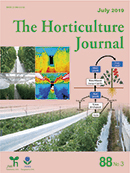
Horticulture Journal
metrics 2024
Advancing Horticultural Excellence Worldwide
Introduction
The Horticulture Journal, published by the Japan Society for Horticultural Science, is a leading academic platform dedicated to the advancement of horticultural research and practices. With an ISSN of 2189-0102 and an E-ISSN of 2189-0110, this journal endeavors to publish high-quality research that emphasizes innovative techniques, sustainable practices, and the science of plant cultivation. The journal has been recognized for its impact within the field, currently holding a Q2 ranking in Horticulture and a Q3 ranking in Plant Science as of 2023, indicating its significant contribution to advancing knowledge. With its open-access model, researchers, professionals, and students have the opportunity to engage with the latest findings, thanks to the journal's commitment to widespread dissemination of information. Since its convergence period began in 2015 and continuing through to 2024, the Horticulture Journal remains instrumental in promoting sustainable and beneficial practices in horticulture science globally.
Metrics 2024
 0.34
0.34 0.90
0.90 1.10
1.10 42
42Metrics History
Rank 2024
Scopus
IF (Web Of Science)
JCI (Web Of Science)
Quartile History
Similar Journals

Journal of Berry Research
Harvesting Research for Berry EnthusiastsJournal of Berry Research, published by IOS PRESS, is an essential scholarly platform that addresses a wide array of topics related to the health benefits, cultivation, and innovation surrounding berry species. With an ISSN of 1878-5093 and an E-ISSN of 1878-5123, this journal has successfully carved a niche in various interdisciplinary fields, achieving notable rankings in its respective categories, including Q2 in Agronomy and Crop Science and Q3 in Biochemistry and Food Science as of 2023. The journal not only serves as a repository of rigorous research but also facilitates the exchange of knowledge among researchers, professionals, and students invested in agronomy, horticulture, and plant science. The HIndex reflects its growing impact within these disciplines. Set against the backdrop of the Netherlands since its inception in 2010, the Journal of Berry Research continues to provide cutting-edge insights, making it a pivotal resource for those pursuing advances in berry research and its associated fields.
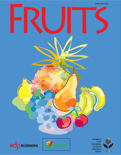
Fruits
Cultivating Knowledge, Harvesting Innovation.Fruits, published by the International Society for Horticultural Science (ISHS), is a pivotal journal in the fields of Agronomy, Food Science, and Horticulture. Since its inception in 1995 and with a continued publication from 2001 to 2024, this journal provides a platform for innovative research and advancements related to fruit science, covering an array of topics from cultivation techniques to post-harvest processing. With an ISSN number of 0248-1294 and an E-ISSN of 1625-967X, *Fruits* engages a global audience, operating out of France and serving as a vital resource for academics, industry professionals, and students alike. Despite its current categorization as Q4 in Agronomy and Crop Science and Q3 in both Food Science and Horticulture, the journal is committed to fostering high-quality research and enhancing its visibility within the academia, as reflected in its Scopus rankings. Readers can expect rigorous peer-reviewed articles that contribute significantly to the understanding of fruit-related science, ultimately driving the advancement of sustainable practices in the field. Emphasizing accessibility, while currently not open access, *Fruits* remains dedicated to disseminating valuable knowledge to enhance the communal pursuit of excellence in horticultural research.
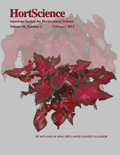
HORTSCIENCE
Nurturing the growth of horticultural excellence.HORTSCIENCE is a prestigious journal published by the American Society for Horticultural Science, focusing on the latest research and developments in the field of horticulture. With an ISSN of 0018-5345 and an E-ISSN of 2327-9834, this journal has established itself as a vital resource for horticultural scientists, practitioners, and educators since its inception. As of 2020, it has embraced an Open Access model, promoting the dissemination of scientific knowledge and enabling wider accessibility to its rich content. HORTSCIENCE currently holds a Q2 ranking in the Horticulture category for 2023, placing it in the top tier of its field with a Scopus rank of 36 out of 115 in the area of Agricultural and Biological Sciences. This journal publishes empirical research, significant advancements, and comprehensive reviews that contribute to the understanding and improvement of horticultural practices, making it an essential publication for anyone involved in horticultural research or education.

JOURNAL OF HORTICULTURAL SCIENCE & BIOTECHNOLOGY
Pioneering sustainable practices in horticulture and biotechnology.JOURNAL OF HORTICULTURAL SCIENCE & BIOTECHNOLOGY, published by Taylor & Francis Ltd, stands as a prestigious platform in the realms of both horticulture and biotechnology. With an ISSN of 1462-0316 and an E-ISSN of 2380-4084, this journal showcases cutting-edge research that advances our understanding of plant science and genetic innovation. Operating under the publication umbrella from 1996 to 2024, the journal has achieved notable rankings, placing in the Q3 quartile for Genetics and Q2 for Horticulture in 2023. With a Scopus ranking of #25/115 in Agricultural and Biological Sciences (Horticulture) and a respectable 78th percentile, it is highly regarded among researchers and professionals alike. While currently not designated as Open Access, the journal remains crucial for academics keen on disseminating groundbreaking findings and techniques that foster advancements in agricultural productivity and sustainability. As an essential resource for researchers, professionals, and students, JOURNAL OF HORTICULTURAL SCIENCE & BIOTECHNOLOGY not only facilitates knowledge sharing within its community but also serves as a vital reference point for future innovations in the field.
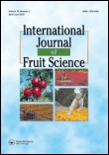
International Journal of Fruit Science
Cultivating innovation in agronomy and horticulture.International Journal of Fruit Science, published by TAYLOR & FRANCIS INC, is a preeminent platform for the dissemination of high-quality research in the fields of Agronomy, Horticulture, Ecology, and Plant Science. With an impressive track record since its inception in 2005 and ongoing convergence up to 2024, this journal serves as a vital resource for scholars and industry professionals alike. Renowned for its rigorous peer-review process and comprehensive publication of cutting-edge studies, it holds a distinguished position in multiple Scopus rankings, including a top 10 placement in Horticulture (Rank #8/115) and notable percentiles, reflecting its significant impact in the academic community. Researchers can delve into critical insights related to fruit cultivation, genetics, and sustainability, bolstered by its Q1 and Q2 quartile standings across various categories. Though the journal is not open access, it remains an essential read for those intent on advancing knowledge and practices within the rapidly evolving landscape of fruit science.

EUROPEAN JOURNAL OF HORTICULTURAL SCIENCE
Pioneering research for the evolution of horticultural science.The European Journal of Horticultural Science, an esteemed publication of the International Society for Horticultural Science (ISHS), serves as a pivotal platform for advancing the field of horticulture since its inception in 2003. With its base in Germany, this journal occupies a significant position in the Q3 quartile of horticultural research, confidently ranked #60 out of 115 in the Agricultural and Biological Sciences category on Scopus, reflecting its relevance and impact within the scholarly community. The European Journal of Horticultural Science fosters open access to a wealth of research and insights, facilitating knowledge sharing among researchers, professionals, and students dedicated to the innovative and sustainable practices in horticultural science. As it embarks on a new chapter through its convergence years leading up to 2024, the journal aims to enhance the dialogue on contemporary horticultural challenges and advancements, making it an essential resource for those seeking to contribute to and learn from ongoing developments in this vital field.
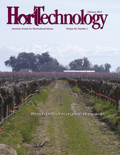
HORTTECHNOLOGY
Empowering research, enriching horticultural practices.HORTTECHNOLOGY is a premier open-access journal published by the American Society for Horticultural Science, focusing on innovative research and advancements in the field of horticulture. With an ISSN of 1063-0198 and an E-ISSN of 1943-7714, this esteemed journal has been disseminating valuable information since 1993 and continues to be a key resource with a convergence period extending to 2024. HORTTECHNOLOGY holds a reputable position in the academic community, classified in the Q2 quartile for horticulture, reflecting its significance and quality within the discipline. Its current Scopus rank places it at 49 out of 115 within Agricultural and Biological Sciences - Horticulture, positioning it in the 57th percentile. Researchers, professionals, and students alike benefit from the accessible research findings this journal offers, addressing critical challenges and advancing knowledge in horticultural practices. HORTTECHNOLOGY is committed to fostering scientific progress and open dialogue within the horticultural community, making it an invaluable resource for anyone passionate about the field.
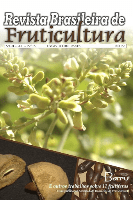
Revista Brasileira de Fruticultura
Connecting Researchers for Global Impact in Fruit ScienceRevista Brasileira de Fruticultura, published by the Sociedade Brasileira de Fruticultura, is a leading scholarly journal dedicated to the advancement of research in the fields of agronomy, crop science, food science, horticulture, and plant science. With an impressive Open Access model adopted since 2001, the journal is committed to disseminating high-quality research from Brazil and beyond, promoting innovation and collaboration among researchers, professionals, and students alike. The journal currently holds a respectable Q3 category ranking in multiple fields as of 2023, reflecting its significance within the scientific community, specifically ranked #72 in horticulture and #257 in agronomy, among its peers. The Revista Brasileira de Fruticultura not only serves as a platform for original research articles, reviews, and case studies but also emphasizes practical applications and sustainable practices in fruit cultivation. Its aim is to enhance the visibility of Brazilian fruit research on a global scale, making it an invaluable resource for those invested in advancing horticultural sciences.

CROP SCIENCE
Transforming agronomy with impactful research and findings.CROP SCIENCE, published by WILEY, is a premier journal dedicated to the field of agronomy and crop science, offering a platform for high-quality research on crop production, genetics, and sustainable agricultural practices. With an impactful presence since its inception in 1974, the journal has become a significant contributor to advancing knowledge in this critical field, as evidenced by its Q2 ranking in the 2023 categorizations and a Scopus rank in the 72nd percentile among its peers. The journal's aim is to disseminate innovative research findings that inform best practices and policies for enhancing crop yield and sustainability, making it an essential resource for researchers, professionals, and students alike. Although CROP SCIENCE does not currently offer open access options, the journal’s extensive readership and reputation make it a valuable asset for anyone invested in the future of agriculture.

HORTICULTURAL SCIENCE
Cultivating Knowledge, Growing Innovation.HORTICULTURAL SCIENCE is a premier scholarly journal published by the Czech Academy Agricultural Sciences, focusing on the myriad facets of horticulture, including plant breeding, cultivation techniques, and sustainable practices. With a robust Open Access model established since 2002, it aims to disseminate high-quality research to a global audience, fostering collaboration and innovation within the field. Located in the heart of Prague, Czech Republic, the journal boasts an impressive Q2 ranking in Horticulture as reported in 2023, placing it within the top tier of its discipline. Furthermore, it ranks 52nd out of 115 in the scope of Agricultural and Biological Sciences, reflecting its growing influence and reach in horticultural research. The journal is an essential resource for researchers, professionals, and students alike, aiming to advance knowledge and practices in horticulture through original research articles, reviews, and case studies. With its commitment to academic rigor and relevance, HORTICULTURAL SCIENCE stands as a vital contribution to the ongoing discourse in horticultural studies.